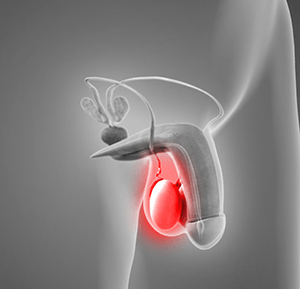
What is Testicular Pain?
Testicular pain is a discomfort that arises in or around one or both testicles. Pain in the testicles may be a result of injury, infection, or serious conditions. Testicles are two egg-shaped organs found in a pouch of skin known as the scrotum. Testicles generate sperm and the hormone testosterone.
What are the Causes of Testicular Pain?
There are numerous possible causes of testicular pain. While testicular pain can result from a condition that requires treatment, some men with experience idiopathic, or unexplained testicular pain. Your doctor will help to identify the source of your pain. Conditions that can cause testicular pain include:
- Orchitis: Inflammation of one or both testicles as a result of viral or bacterial infection
- Epididymitis: Inflammation of the epididymis, a coiled mass of thin tubes that transfers sperm from the testes to the sperm duct
- Inguinal Hernia: A part of the intestine that bulges out through a weak section of the stomach muscles close to the groin
- Hydrocele: Collection of fluid around the testicle
- Injury or Trauma: An injury to the testicles due to an accident, fight, or physical activity
- Spermatocele: Fluid collection in a cyst near the testicle
- Varicocele: A group of enlarged veins in the testicles
- Testicular Torsion: Twisting of one or both testicles cutting off the supply of blood to the testicle
- Kidney stones: Causing referred pain in the scrotum
- Nerve impairment: Of the scrotum caused by diabetic neuropathy or surgery in the area
- Prostatitis: Inflammation or infection of the prostate gland
- Urinary tract infection
- Chronic pelvic pain syndrome
What are the Symptoms Associated with Testicular Pain?
Testicular pain can be felt in many ways, depending on the source:
- Soreness or tenderness of the testicles
- Heavy or achy feeling in the groin, lower abdomen, or testicles
- Pain in the testicles
- Groin or lower abdominal pain
- Swelling or redness in the testicles
- Fever
- Nausea and vomiting
- Abdominal pain
How is Testicular Pain Diagnosed?
Your doctor will review your symptoms and medical history, perform a physical examination of your groin, abdomen, and scrotum to determine the source of pain, and order certain diagnostic tests for confirmation, such as:
- Urinalysis to check for urinary tract infection
- Screening for sexually transmitted diseases
- Ultrasound of the scrotum
- CT scan and MRI
- Rectal exam
How is Testicular Pain Treated?
Minor cases of testicular pain can be treated conservatively, but in serious cases, surgery may be required. Some of the measures employed to mitigate testicular pain include:
- Use of ice packs to reduce swelling and pain in the scrotum (never apply ice directly to your skin)
- Taking warm baths
- Wearing an athletic supporter to support the scrotum
- Over-the-counter pain medications
- Placement of a rolled towel under the scrotum for support
- Antibiotics to treat infection
- Surgery to treat serious conditions such as testicular torsion, hydrocele, etc
When Should You Visit Your Doctor?
You should visit your doctor if you develop testicular pain along with:
- Lump on your scrotum
- Fever
- Tenderness, warmth, redness in your scrotum
- Severe or sudden testicular pain
- Nausea or vomiting
- Swelling caused by an injury to the scrotal area
How Can You Prevent Testicular Pain?
Some of the healthy practices employed to prevent testicular pain include:
- Practicing safe sex to avoid sexually transmitted diseases
- Wearing an athletic supporter to avert trauma to the testicles
- Self-examination of the testicles once a month to feel for any lumps or changes
- Complete emptying of the bladder on urination to avoid urinary tract infections
